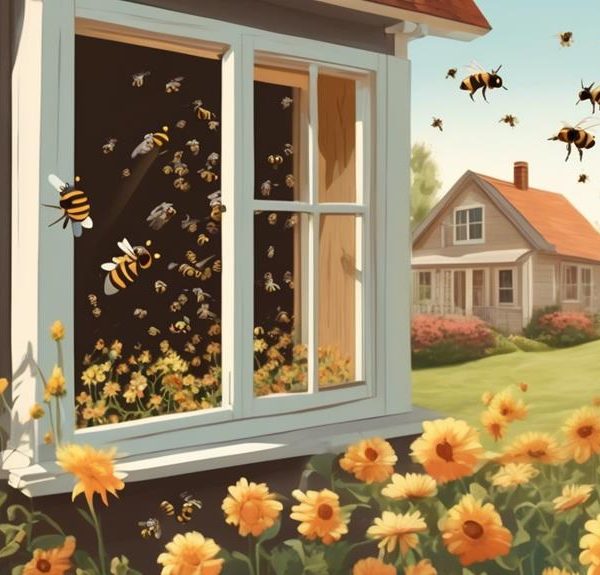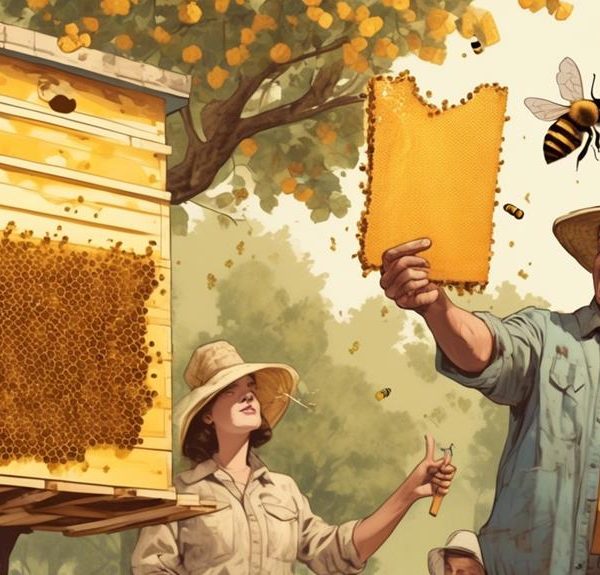Harness the truth about using wasp spray on bees, uncovering environmental, legal, and effectiveness concerns that might sting more than you think.
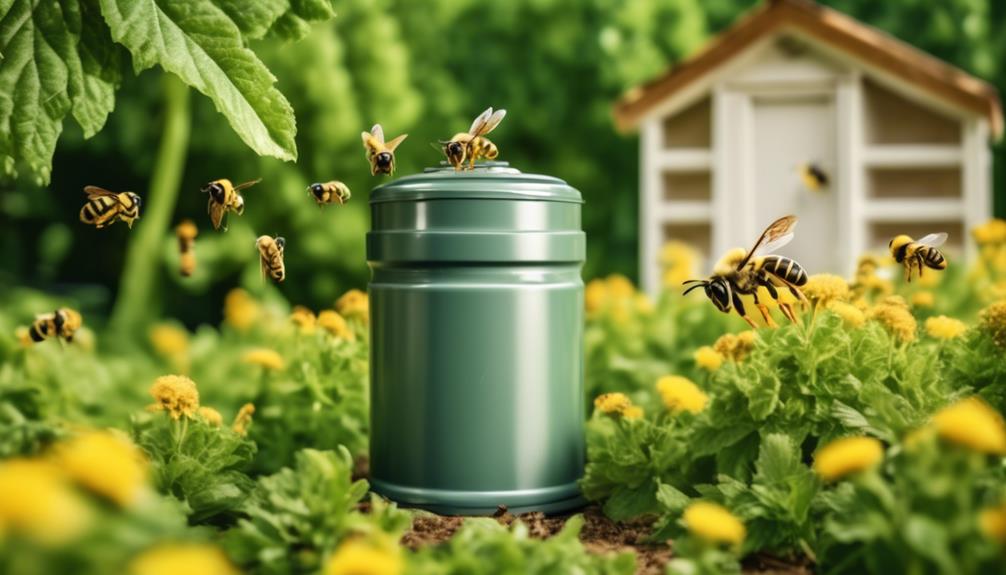
Can You Kill Bees With Wasp Spray?
While you may think that all insects are created equal when it comes to insecticides, that's not entirely the case. You've got a buzzing problem in your backyard, and you're wondering if the wasp spray in your garage will do the trick on those troublesome bees.
Yes, many wasp sprays can kill bees but it's important to know that this method isn't as straightforward as it might seem. There are potential environmental repercussions, legal considerations, and effectiveness issues to consider.
So, before you pull the trigger on that can, let's unpack the complexities behind this seemingly simple question.
Key Takeaways
- Wasp spray contains insecticides that can have devastating effects on bees, including long-term colony collapse.
- Bees can be exposed to the spray by carrying it back to the hive and through contaminated flowers and plants.
- Chronic exposure to wasp spray weakens bees, making them more susceptible to disease and reducing their lifespan.
- The use of wasp spray on bees has far-reaching environmental consequences, including threats to plant diversity, the food chain, and water and soil contamination.
Understanding Wasp Spray Ingredients
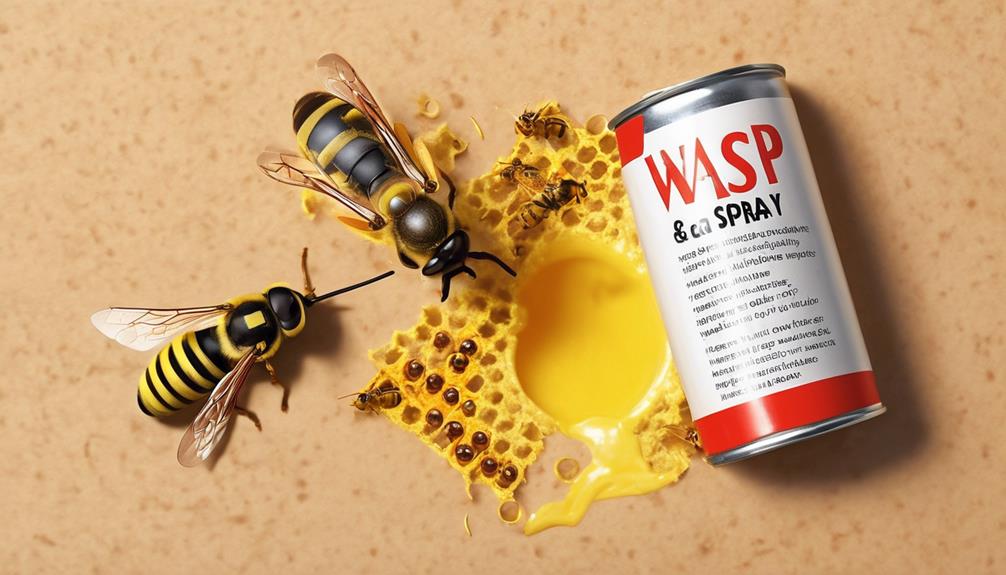
To fully grasp the lethal effect of wasp spray on bees, you need to understand its key ingredients. Wasp spray contains a cocktail of chemicals, primarily insecticides like pyrethrins and pyrethroids. Pyrethrins are naturally occurring compounds derived from certain species of chrysanthemum plants, known for their insecticidal properties. Pyrethroids, on the other hand, are synthetic versions of pyrethrins. They're designed to be longer-lasting and more potent, which often makes them harmful to non-target species, like bees.
You'll also find a chemical called piperonyl butoxide (PBO) in wasp spray. PBO isn't an insecticide in itself but acts as a synergist, enhancing the potency of pyrethrins and pyrethroids. It inhibits the enzymes that insects use to break down the insecticides, making them more susceptible to the lethal effects of the active ingredients.
This lethal trifecta of chemicals is highly effective against wasps but can wreak havoc on bees. Spraying a hive with wasp spray not only kills the bees directly exposed to it but also contaminates their habitat, leading to long-term colony collapse.
Impact of Wasp Spray on Bees
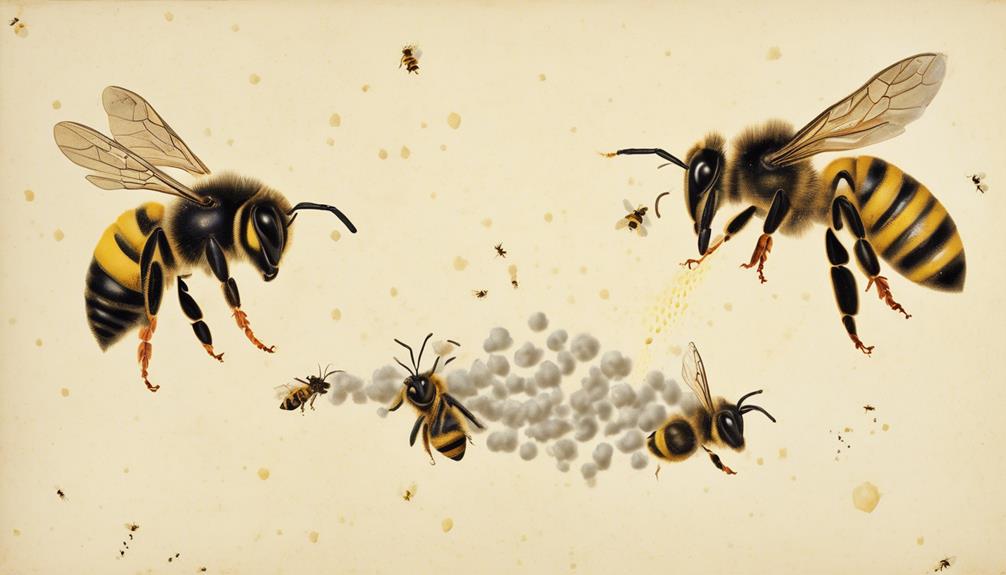
Often underestimated, the use of wasp spray on bees can cause catastrophic damage to the entire bee colony, not just those directly exposed. Wasp sprays typically contain potent neurotoxins like pyrethroids, which act on the nervous system of insects.
When you spray a bee, these toxins can quickly lead to paralysis and death. However, the impact doesn't stop there. Bees often carry the spray back to the hive on their bodies, unintentionally exposing the entire colony. This can result in a domino effect, decimating the bee population in a short time.
Moreover, the residue of wasp spray lingers in the environment, contaminating the flowers and plants that bees frequent. This results in further exposure, even long after you've sprayed. The chronic exposure can weaken the bees, making them more susceptible to disease and reducing their lifespan.
Environmental Consequences Explored
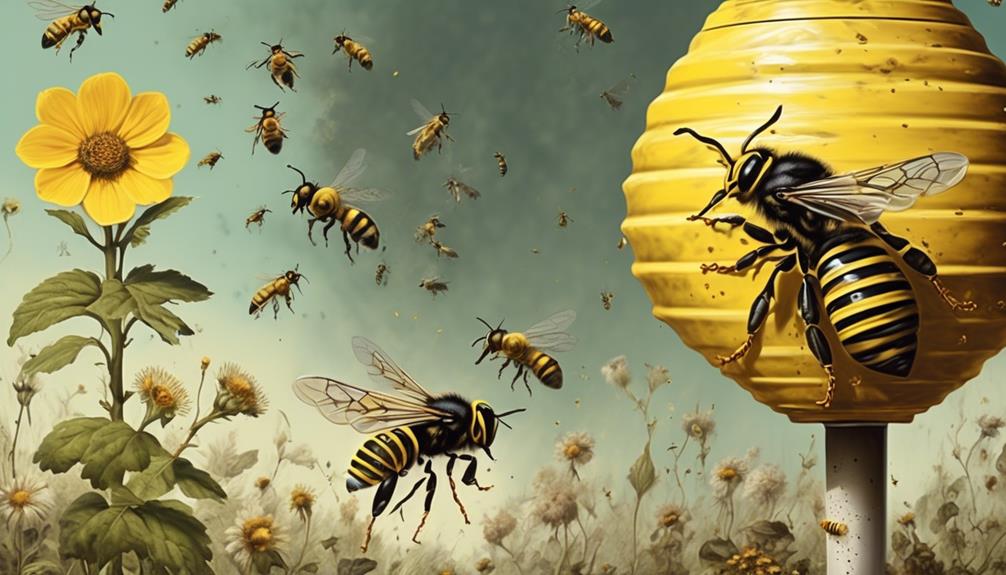
While the immediate effects of wasp spray on bees are devastating, it's crucial to understand the far-reaching environmental consequences that come with it. Bees are a key component of our ecosystem, serving as primary pollinators for a multitude of plant species. Their decline can lead to decreased plant diversity, which in turn affects the entire food chain.
When you kill bees indiscriminately with wasp spray, you're not just dealing with a minor pest problem; you're tampering with an essential ecological process. Reduced bee populations can lead to a decrease in the pollination of both wild plants and agricultural crops, threatening our food security. This is particularly concerning given that over 75% of the world's food crops rely to some extent on pollinators.
Moreover, wasp sprays often contain potent neurotoxins that can contaminate soil and water. These toxins don't just disappear; they can persist in the environment, affecting a range of non-target organisms, from birds to aquatic life. Through biomagnification, these toxins can even accumulate up the food chain, reaching levels that pose significant risks to larger predators, including humans.
In brief, the environmental consequences of using wasp spray on bees are far-reaching and potentially disastrous. Your actions today can impact the health of our planet for generations to come.
Legal Implications of Bee Killing
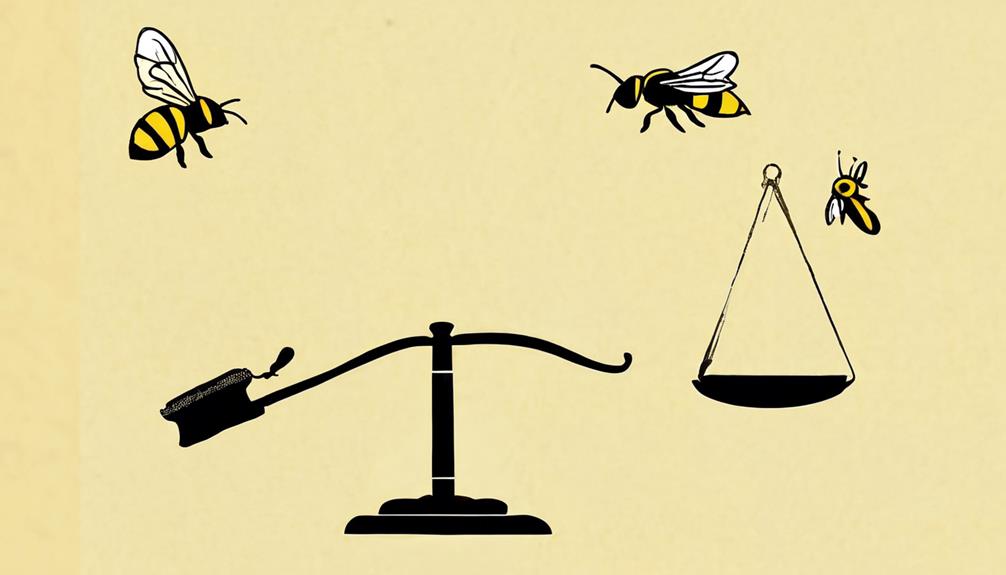
Navigating the legal landscape surrounding the killing of bees with wasp spray reveals a complex tangle of laws and regulations that you must be aware of.
Many countries, including the US, have regulations that protect pollinators like bees due to their vital role in ecosystems and agriculture. Deliberately killing them can result in fines or even jail time.
In the US, for example, the Endangered Species Act of 1973 protects several species of bees. Violating this Act can result in penalties up to $50,000 or imprisonment for up to one year, or both.
Meanwhile, in the UK, the Wildlife and Countryside Act of 1981 makes it illegal to intentionally kill, injure, or take any wild animal, including bees, without a permit.
Furthermore, using wasp spray on bees may violate pesticide laws, as these products aren't designed for bees. In the US, the Federal Insecticide, Fungicide, and Rodenticide Act regulates the use of pesticides and misusing them can lead to penalties.
Alternative Solutions for Bee Problems
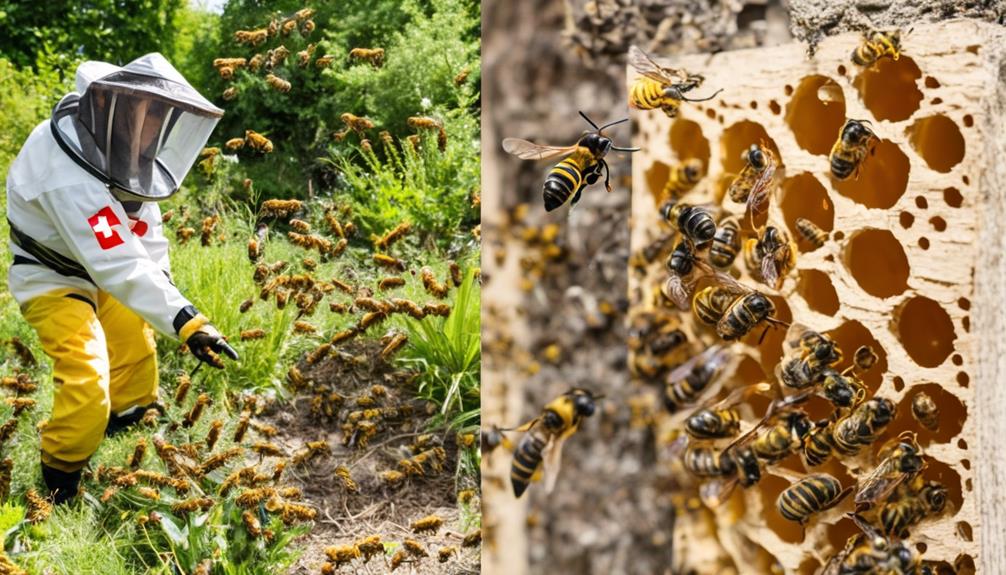
Given the legal implications and potential harm to ecosystems, it's crucial to consider non-lethal, bee-friendly alternatives when you're faced with a bee problem. The first approach could be to simply leave the bees alone. Bees are typically non-aggressive and won't harm you unless provoked. If the bees' presence is indeed a nuisance, consider using natural repellents like citronella or peppermint oil, which are known to deter bees without causing them harm.
If their presence persists or poses a threat due to allergies, consider professional relocation. Beekeepers or pest control agencies often offer such services, ensuring the bees are safely moved to a suitable environment. This not only solves your problem but also aids in the conservation of these pollinators, essential to our ecosystem.
In residential areas, deterrent plants can also be a solution. Certain plants like wormwood, eucalyptus, and citronella are known to repel bees. Planting these around your house can create a natural barrier.
Frequently Asked Questions
What Are Some Home Remedies to Safely Repel Bees?
You're looking for home remedies to repel bees, right?
Well, you can use peppermint essential oil as a natural bee deterrent. Simply mix it with water in a spray bottle and apply around your home.
Another method is using cucumber peels, bees dislike their bitter taste.
Lastly, you can plant bee repelling plants like citronella or marigold in your garden.
However, always remember, bees play a crucial role in pollination so it's best to avoid killing them.
Can Bees Become Resistant to Wasp Spray Over Time?
Yes, it's possible for bees to develop resistance to wasp spray over time, just like any other insect. This happens when a few bees survive the pesticide and pass on their resistance to their offspring.
However, it's not guaranteed and depends on many factors. Remember, it's best not to use wasp spray on bees because it's harmful to them and the environment.
Try using natural repellents instead.
How Can I Identify if the Insect Is a Bee or a Wasp?
Sure, you can distinguish between bees and wasps by observing their physical features. Bees are hairy, allowing for pollen to stick to them, while wasps have smooth and shiny bodies. Bees are more robust and wasps are slender with a narrow waist.
Additionally, bees are more likely to be seen pollinating flowers, while wasps are often found around food or trash. It's crucial to correctly identify them to avoid unnecessary harm.
Can Wasp Spray Harm Other Beneficial Insects?
Yes, wasp spray can harm other beneficial insects. It's not selective and affects a wide range of insects. When you spray it, you're likely to impact insects beyond your intended target.
It can kill pollinators like bees and butterflies. These insects play a crucial role in our ecosystem.
What Are the Health Risks Associated With Using Wasp Spray Around Children and Pets?
Yes, using wasp spray around children and pets can pose serious health risks. You're introducing potent chemicals into their environment, which can result in skin and eye irritation, breathing problems, and even poisoning if ingested.
It's particularly dangerous for pets who may lick sprayed surfaces. Additionally, long-term exposure can lead to more severe health issues.
Always use such products judiciously and keep them out of reach from kids and pets.
Conclusion
While you can kill bees with wasp spray, it's definitely not the best approach. The environmental impact is severe, harming not only bees but other beneficial insects and ecosystems. Plus, it's potentially illegal due to the essential role bees play in pollination.
Instead of resorting to harmful sprays, consider alternative solutions like professional removal or creating a bee-friendly habitat away from your home.
Remember, bees are crucial for our ecosystem's survival.

